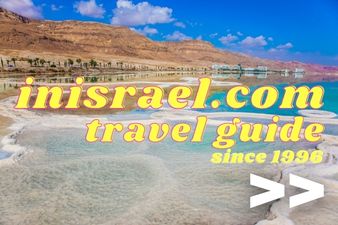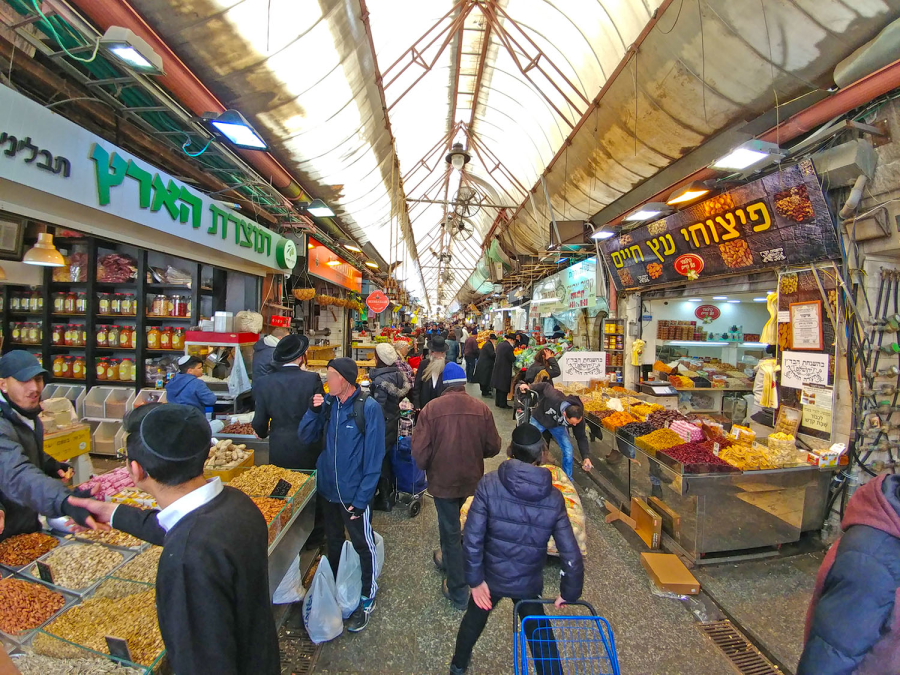Mahane Yehuda Market – A Day at “The Shuk”
Jerusalem travel guideOne of the most colorful spots in Jerusalem and a must visit for any tourist to the city, is the vibrant Mahane Yehuda Market, or “The Shuk” as they say in Hebrew. Whether you decide to visit it on Friday, its busiest day in the week, or on any other weekday, there are quite a few milestone’s in the market which are a delight for the eye and of course the palate.
Located between Jaffa and Agripas St. “The Shuk” can be easily reached by walking from the bus station or by almost any bus route in Jerusalem. Inside, it is divided by streets named after fruits and has both an open aired area and a covered one.
With over 250 vendors in the market, selling mostly foods from a large variety of Jewish communities from all over the world, even if one plans on simply absorbing the market through his senses, it’s always a good idea to have a list with the market’s finest restaurants and vendors, to make the best out of your day in the market.
Here is a Virtual tour of the Mahane Yehuda Market >>
Marzipan, 44 Agripas St.
Start off just before entering the market at the famous Marzipan bakery. Besides having a name after a delicious almond treat, Marzipan is famous for its sweet pastries dispersing its fragrances from outside the market. If you’re a chocolate lover (and who isn’t?), don’t miss out on their famous chocolate rogalach, yummy.
Uzi-Eli, 10 Ha’egoz St.
Take a right from Agripas St. into the first entrance of the covered market on Ha’egoz St. (Nut St. in Hebrew) and walk until you reach a picturesque juice stand on your right called Uzi-Eli. Uziel the owner, is a cute looking 68 year old man originally from Yemen who’s referred to as “The Dr.” Besides his juices which are said to have unique healing qualities from helping headaches to improving your stamina, the doctor offers creams and sprays as well for the skin and will happily give you your own personal diagnosis.
The Halva Kingdom, 75 Etz Ha’haim St.
Once you get to Hashaked St. (Almond), turn right and then left on Etz Ha’haim St. (Tree of Life) and walk until you see a large halva stand to the left, known as The Halva Kingdom. There you’ll find every kind of sweet tahini and honey mixture you could ever dream of, plus a few baklavas if you have an endless sweet tooth. Make sure to try the excellent King’s Halva and maybe even take a few packs with you back home – where the sweet delight will be even more appreciated.
Ha’agas Ehad, 1 Banay St.
Located in the heart of the market on the old Pear St. (Ha’agas) is Ha’agas Ehad. Although today the street is named Banay St., after Eliyahu Yaakov Banay, one of the four fathers of the famous Banay family in Israel, we can still find on the same spot, the well known fresh vegan cuisine restaurant, Ha’agas Ehad. If at this point of the day your only craving is for a salad, no doubt this place would be your best choice.
Mizrahi, 12 Hashazif St.
Another famous establishment of the market, on Hashazif St. (Plum) parallel to Banay St. is the Mizrahi restaurant. Once a home to a spice stand, today, the daughter of the spice stand owner, runs a family based restaurant called Mizrahi, serving deliciously authentic cuisine on Kerosene stoves.
Mazetim, 11 Hashazif St.
Just across the restaurant, if you’re thinking of eating in, is a great cheese shop called Mazetim, where you can get the best cheeses from all over the country and abroad. Just be careful while walking around the shop, near almost every cheese you can find a few cut squares from it for you to try, not the best for someone on a diet.
Mousseline, 17 Ha’egoz St.
Another thing that’s best to stay away from if on a diet is Mousseline ice-cream shop. Fairly new to the market, back on Ha’egoz St, Mousseline has already managed to get quite a fan base for itself, with hard ice-cream addicts going crazy for their odd but tasty basil grapefruit flavor.
The Iraqi Shuk
After so much eating it might be a good idea to relax a bit and watch others relax as well. The Iraqi part of the market, set in its back is probably a good bet for that. Watch a large group of diverse grandfathers (not only Iraqi) play backgammon and cards, relaxing under the sun, either rain or shine. Try talking to them, if you look naïve enough, they might even let you play with them…
Hachipuria, 6 Eshkol St.
If you become hungry after your backgammon game, take a right when coming out of the Iraqi market just before going back into the shuk, to Eshkol St. There in a Georgian bakery, you can enjoy some yummy Georgian cuisine consisting mostly of cheese and dough. Hachipuria has a large variety of oily dough with cheese but if still on a diet, just take a sip of their local Georgian drink.
Mahneyuda, 10 Beit Ya’akov St.
Oddly enough, the one thing your day out to “The Shuk” won’t be complete without is a visit to a new restaurant just outside the market named Mahneyuda. Run by three of the best chefs that Jerusalem has to offer, Mahneyuda prouds itself in having a different menu everyday, printed daily on recycled paper, that’s decided on according to the catch of the day from the market. With small to main courses set by prices from low to high (only up to 130 NIS per course) on the menu and an open kitchen where you can actually see how the food is made, there’s no wonder one needs to book at least two days in advance to get a table.
The people, the smells, the flavors and the sounds of the bustling market will all boil down as night sets on Jerusalem. At that point you can find yourself going back to your hotel after a crazy but definitely filling day at “The Shuk”.






